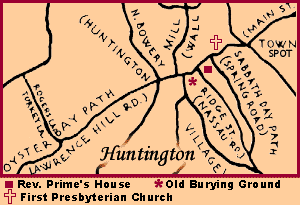Colonial History of the Huntington Public Library
-The
Beginning-
Unlike the public library as we know it now, Huntington's first
library was an association library.
The earliest records we have were found in the late 1800's in
the home of Mrs. Isaac Rogers. In a little black book, there was
covenant manuscript, dated June 29, 1759, that reads:
| ||
| Thus, the thirty-nine members entrusted their library to the care of Reverend Ebenezer Prime (1700-1779), the pastor of the First Presbyterian church, located on the north side of Oyster Bay Path (now Main St.). Rev. Prime was a member of the first graduating class at Yale and was a learned and well-respected citizen of Huntington. He owned a large and valuable library. Many of his books were imported from England and included the Greek and Latin classics. The collection was housed in a "box of shelves" in his home on Spring St. He held the office of "Library Keeper" until April 21, 1762 when he was succeeded by Obediah Platt. | ||
 For the original subscribers, their membership
allowed them to borrow books of their choosing for a
two-month loan period. For those who were delinquent
in returning their books, a "one copper per diem"
fine was charged against them. If a book was damaged a committee of
subscribers assessed costs which were expected to be paid promptly.
Violators of library rules were refused the loan of books. The
subscribers formed an exclusive group, no one was allowed to lend their
books to anyone outside of their households, upon penalty of a fine.
Mr. Prime was instructed to "shut the library doors" upon any repeat
offenders of the library rules.
For the original subscribers, their membership
allowed them to borrow books of their choosing for a
two-month loan period. For those who were delinquent
in returning their books, a "one copper per diem"
fine was charged against them. If a book was damaged a committee of
subscribers assessed costs which were expected to be paid promptly.
Violators of library rules were refused the loan of books. The
subscribers formed an exclusive group, no one was allowed to lend their
books to anyone outside of their households, upon penalty of a fine.
Mr. Prime was instructed to "shut the library doors" upon any repeat
offenders of the library rules.
The first collection of
155 books was comprised largely of religious volumes. There were no
works
of fiction.
When the Revolutionary War broke out, the British occupied Huntington and the Reverend Prime's home and church were used to quarter British soldiers and store supplies. Rev. Prime was known to be a Patriot (referred to as "the Old Rebel"), and the destruction of his home by Colonel Benjamin Thompson (later Count Rumford) and his troops led to a fierce feud between the two. It is said that after Prime's death in 1779, Thompson ordered that his Fort Golgotha tent be placed next to Prime's burial plot. It gave him great pleasure to trod upon "the _____ Old Rebel's" grave. The original collection was destroyed during this time, although it is said that a member of the Prime family has one remaining, theological volume, minus the cover and title page, in his possession. The library record ends in 1768. Another attempt to form an association library was made on April 9, 1802, when a group of 23 citizens entered into a similar contract. It cannot be said that there is a direct connection between the two. Rev. William Schenk, and Nathaniel Potter, acting as clerk, chaired this second library. Records from this period are scant, but they show that the library was functioning in 1817 and 1822, when Abel Ketchum was acting librarian. From 1822-1825 the library was housed at the northwest corner of Main St. and Prime Ave. in the home of librarian, Russell Woodward. Samuel Fleet (1786-1864) was an enterprising citizen at this time. He was a hotel keeper, storekeeper, postmaster, principal of the Academy school and editor of Long Island's first magazine:"Long Island Journal of Philosophy and Cabinet of Variety". He owned a large two-story dwelling facing the Town Spot (now Village Green), and he ran most of these businesses from home. Since his home became a hub of activity for the community, and because of his literary interests, it naturally fell to him to house the library and add Librarian to his many occupations. He held this office from 1825-1827. After 1827, the library fell into disuse. These were years that saw a great interest in societies dedicated to the "evils of drink". Huntington's citizens formed the "Huntington Workingmen's Temperance Benevolent Society" and the "Huntington Total Abstinence Temperance Society" that occupied much of their spare time, to the effect that there was little library activity. In 1843 Edward Crowell, editor of the Long Islander gave this description of the books:"read and reread, and they have become obsolete, and are lying upon the dusty shelves, unsought and unthought of". This column must have had the desired effect for the next week a meeting was called for "co-operation in reviving the Town Library". The following week saw a notice of a Contitution and by-laws being drawn up for what would become the beginnings of the Huntington Library Association. | ||
| Continue reading ......the Civil War history |
| "The Past - the dark unfathom'd retrospect! |
| The teeming gulf - the sleepers and the shadows! |
| The past! the infinite greatness of the past! |
| For what is the present after all but a growth out of the past?" |
| Walt Whitman (1819-1892) |

